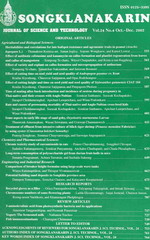ThaiScience
ThaiScience
SONGKLANAKARIN JOURNAL OF SCIENCE & TECHNOLOGY
Volume 41, No. 05, Month SEPTEMBER, Year 2019, Pages 1084 - 1092
Tertiary treatment of wastewater by electro-coagulation, electro-fenton and advanced electro-oxidation processes comparative and economic study
Faical Gaied, Boulbaba Louhichi, Mahmoud Bali, and Mohamed Razak Jeday
Abstract Download PDF
Due to water scarcity and population growth the use of treated wastewater in agriculture has become more frequent. With this motivation, several technologies have been introduced for the treatment of wastewater. The present work aimed at the tertiary treatment of the polluted water of Tataouine sewage treatment plant (Tunisia) using three alternative processes, namely electro-coagulation (EC), electro-Fenton (EF), and advanced electro-oxidation (AEO). After 180 min, chemical oxygen demand (COD) and biochemical oxygen demand (BOD5) abatement rates reached respectively 56% and 14% with sharp deterioration of germs by EC process, and 75% and 52% with complete degradation of germs when EF process was applied. On the other hand, with AEO process, abatement rates of COD and BOD5 were 92% and 57%, respectively, with complete degradation of germs. The economic study showed that the EF process is technically and economically the best of these alternatives for treatment of this wastewater.
Keywords
urban wastewater, microbial loads, organic matter, electro-coagulation, electro-Fenton, advanced oxidation, economic studySONGKLANAKARIN JOURNAL OF SCIENCE & TECHNOLOGY
Published by : Prince of Songkla University
Contributions welcome at : http://rdo.psu.ac.th
